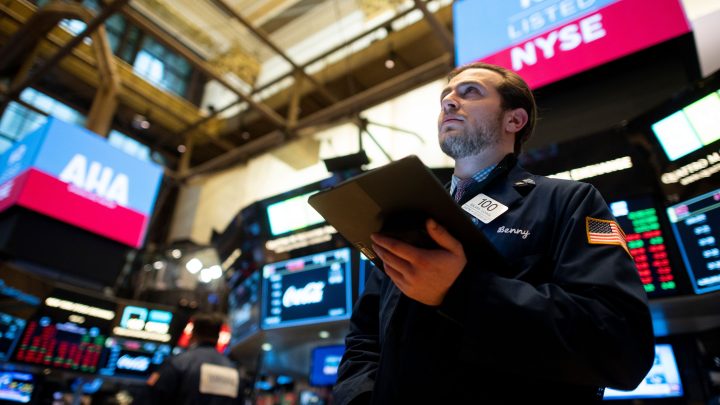
What to do when the markets plummet and you’re nearing retirement
Share Now on:
What to do when the markets plummet and you’re nearing retirement

This article originally ran on Feb. 27, 2020. It has been updated.
This is a deeply unsettling time, in the United States and around the world.
Public life and economic life are shutting down — for how long, no one knows — as governments scramble to try to slow the spread of COVID-19.
And the markets are reacting, despite federal efforts to calm investors. This week, they recorded their worst single-day drop since 1987.
So what does all this mean if you have money invested in the stock market, particularly if you’re retired or nearing retirement? Does that age-old advice — not to panic, and just ride it out — still hold?
Short answer: yes.
Slightly longer answer: yes, mostly. But there are a few things you can be thinking about, and that you might want to do.
For retirees — and really everyone right now — “the big thing is just make sure they have their immediate cash needs ready to go,” said Shashin Shah, a managing director at SFMG Wealth Advisors in Plano, Texas. “There’s not any amount of risk that would make sense if there’s money that’s needed this year or the year after. And it’s important to map that out quite a bit.”
Beyond those immediate cash needs, for the next year or two, maybe three, Shah said he’d tell older people pretty much the same thing he’d tell younger people: hang in, ride it out, the markets should bounce back — historically they have.
That is generally the advice from financial planners and retirement experts across the board.
Rita Cheng, a certified financial planner in the D.C. area, said she has been hearing from nervous clients, and reaching out to others to reassure them, and to remind them that the market is volatile, that that’s something they should always expect and be prepared for. She gets, though, that it is stressful to see these kinds of sharp drops, especially for people who are no longer working.
“For someone who has just retired or who is planning to retire in the near future it can be unsettling because 2007 to 2009 is not that long ago,” Cheng said. “What I do, and what I encourage clients in this situation to do, or even investors, is to remember first, just because you may be 60 or 65, you are still a long-term investor.”
“For someone who has just retired or who is planning to retire in the near future it can be unsettling because 2007 to 2009 is not that long ago,” Cheng said. “What I do, and what I encourage clients in this situation to do, or even investors, is to remember first, just because you may be 60 or 65, you are still a long-term investor.”


That is a critical point, Cheng and Shah and other advisors point out. Even those who are retired are still playing the relatively long game.
“Anyone approaching retirement has to think in terms of decades, not in terms of next year or the year after,” Shah said. “Otherwise everyone would go straight to cash the minute they retire.”
“That’s a really, really important point is that you don’t need 100% of your money on your first month in retirement,” said Alicia Munnell, director of the Center for Retirement Research at Boston College. “It’s a long period of time, 25, 30 years, and so you’re probably not going to be cash-constrained immediately because of a precipitous drop in the stock market.”
Ideally, if you’re retired or on track to retire in the next few years, you already have a good plan in place for these kinds of inevitable market fluctuations. And if you don’t, now is still probably not the moment to be moving things around too much, right in the middle of a big drop. With one exception, Shah said: now is a good time to rebalance and reassess your risk.
“Sometimes risk tolerance can change,” he said. And in terms of rebalancing — strategically — “selling bonds high and buying stocks low can be helpful at times like this.”
Big picture, though, “this is a teaching moment in one regard, not that people should panic and sell when the stock market goes down 6% or 7%, but rather that as people approach retirement, they should be shifting out of equities and into a safer asset,” Munnell said. “People as they’re approaching retirement should be protecting themselves from being exposed to the harm that can be done by this kind of precipitous drop in the market.”
Now, and always, that is the key word for people nearing retirement: plan.
“Have a financial plan, a financial plan that takes into account that not everything will be the market going up, we’ll also have markets that go down, and wildly go up and down from time to time,” said Dan Keady, chief financial planning strategist for TIAA. “It’s kind of like if you got in your car and you were going for a long ride and you didn’t have any GPS and you didn’t have any map. I think almost all of us would be panicked. And that’s what happens to too many people.”
And the last thing you want is to be making big financial decisions purely based on emotion.
“Because our emotion that goes back to prehistoric times is you want to run when you see this kind of, for lack of a better word, danger,” Keady said. “And you need to be able to get past that. And the way to do that really is to have a good plan.”
These are also, he acknowledged, unusual times, and a lot of people are “really looking to do something because all of us innately want to take action when something happens. It’s just part of human nature.”
If that’s you, Keady suggests taking small steps, like paying down credit card debt, building up a bit more savings, or if you’re still working, putting a little more into your workplace retirement account.
“Maybe you think through and spend some time just listing what your financial assets are, and saying, ‘hey, you know, wait a second, I’ve got this money I could pull from that hasn’t gone down in value,” Keady said. “I think these small steps have two values. One, they’re things we should always do. But number two, it can help people focus in a proactive manner because it’s really part of taking care of yourself innately.”
That said, “if you’re thinking of doing something drastic,” he added, “you should really talk to someone first.”
Cheng talks about retirement planning as a bucket approach: having a short-term bucket, a medium-term bucket, and a long-term bucket.
“I always make sure that my pre-retirees and retirees have money that they can access in the short term that will not be subject to market volatility,” she said. “And then I can keep them invested in the long term because if they have confidence knowing that they’re going to be okay for one, two, three years, they are more likely to stay invested.”
And more likely, then, to reap the benefits when the market bounces back. Which it should, sooner or later.
“The economy is basically strong,” Munnell said. “I think this is really a reaction to the virus, and that will play itself out. And I think that the best guess is that the market will recover.”
Though, Keady said, no one knows how quickly, and it’s important to not expect a quick, V-shaped recovery.
“That’s what I think is so different is it’s kind of hard to guess when this thing is going to recede. Until we see cases go down, until we see vaccines. A lot of these things are very hard to predict,” he said. “But I would encourage people to push out the timeframe a little bit. Let’s say that you’re looking at retirement goals that are 20 years out, or even 5 years out. There’s a very good chance that you would be in a better situation at that point in time, that things ultimately will resolve.”
There’s a lot happening in the world. Through it all, Marketplace is here for you.
You rely on Marketplace to break down the world’s events and tell you how it affects you in a fact-based, approachable way. We rely on your financial support to keep making that possible.
Your donation today powers the independent journalism that you rely on. For just $5/month, you can help sustain Marketplace so we can keep reporting on the things that matter to you.


















